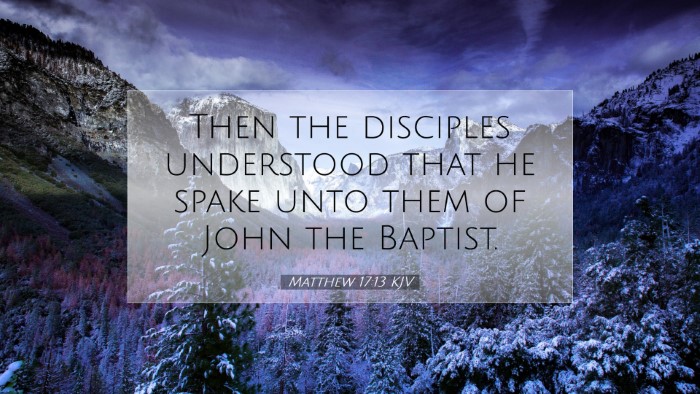Commentary on Matthew 17:13
Verse: "Then the disciples understood that he spake unto them of John the Baptist."
Contextual Overview
Matthew 17:13 appears in a pivotal section of the Gospel, following the Transfiguration of Jesus. The moment is charged with theological implications regarding the identity of Jesus as the Messiah and the prophetic role of John the Baptist. The disciples' realization at this moment signifies a deeper understanding of Jesus' ministry and God's plan of salvation.
Insights from Public Domain Commentaries
Matthew Henry
In his treatise, Matthew Henry emphasizes the gradual understanding of the disciples. The confession of Peter earlier in the Gospel affirmed Jesus as the Christ, yet this understanding deepens as they observe Jesus’ interaction with both the Law and the Prophets. Henry elaborates that by referencing John the Baptist, Jesus highlights a significant point about the continuity of God's revelation. John is seen as the greatest of the prophets, which positions him not merely as a forerunner but as a critical link in the chain of divine communication.
Key Themes from Henry:
- Recognition of True Prophecy: The verse underscores the importance of recognizing true prophets. John the Baptist’s role was essential, and his sufferings foreshadow those who embrace God’s truth.
- Enduring Understanding: Henry argues that understanding divine revelation can be progressive. The disciples might have previously viewed John merely as a martyr, but Jesus’ reference brings a deeper spiritual context.
Albert Barnes
Barnes observes that this statement by Jesus serves not only to clarify the identity of John but also to affirm the prophetic lineage that culminates in Christ. He notes that Jesus wanted the disciples to see John in the light of the Scriptures’ fulfillment, illustrating how John came in the spirit of Elijah and prepared the way for the Lord.
Significant Points from Barnes:
- Connection to Prophecy: Barnes highlights how the disciples' understanding of John as the Baptist connects with their comprehension of the Messianic prophecies, thus reinforcing the legitimacy of Jesus' ministry.
- John's Testimony: John’s identity as the precursor to Christ was vital, affecting how the disciples would later preach the Gospel of the Kingdom.
Adam Clarke
Clarke’s commentary reflects on the disciples’ mental and spiritual development. He explicates that the realization that John the Baptist is the subject of Jesus’ words provided clarity about the divine plan for redemption. Clarke notes the significance of John’s role in the context of the kingdom of heaven and its proclaimed arrival through the ministry of Jesus.
Insights from Clarke:
- Theological Significance: Clarke points out that understanding John’s role enhances the understanding of the Kingdom of God and its radical nature as it confronts societal norms.
- Jesus as Fulfillment: He stresses the importance of viewing Jesus as the fulfillment of all Old Testament prophecies, with John serving as the final prophet heralding this new covenant.
Theological Implications
The verse carries weighty implications regarding the continuity of God's redemptive work. The disciples' understanding that John is linked to Jesus allows us to appreciate the sovereign plan of God, culminating in Christ's redemptive act. This transition from the prophetic era to the messianic plan is a foundational aspect of Christian theology, elevating the role of both Jesus and John the Baptist. The acknowledgment of John the Baptist also invites reflection on the cost of true discipleship, as John faced persecution for proclaiming the truth.
Practical Applications
For pastors and theologians, this passage serves as a strong reminder to emphasize the continuity of scripture and the importance of understanding our place within God’s grand narrative. Just as the disciples needed to grasp the significance of John, modern readers must comprehend the foundation upon which they stand in faith. It invites believers to consider their role as witnesses and proclaimers of God’s truth, much like John.
Conclusion
In summary, Matthew 17:13 offers deep insights into the identity of John the Baptist as a prophet and herald of Christ. The interplay between understanding, prophecy, and Jesus’ ministry brings forth a rich tapestry of theological and practical applications for believers today. This verse not only enriches our comprehension of the Gospel account but also challenges us to live out the truth of the Kingdom with courage and conviction.


